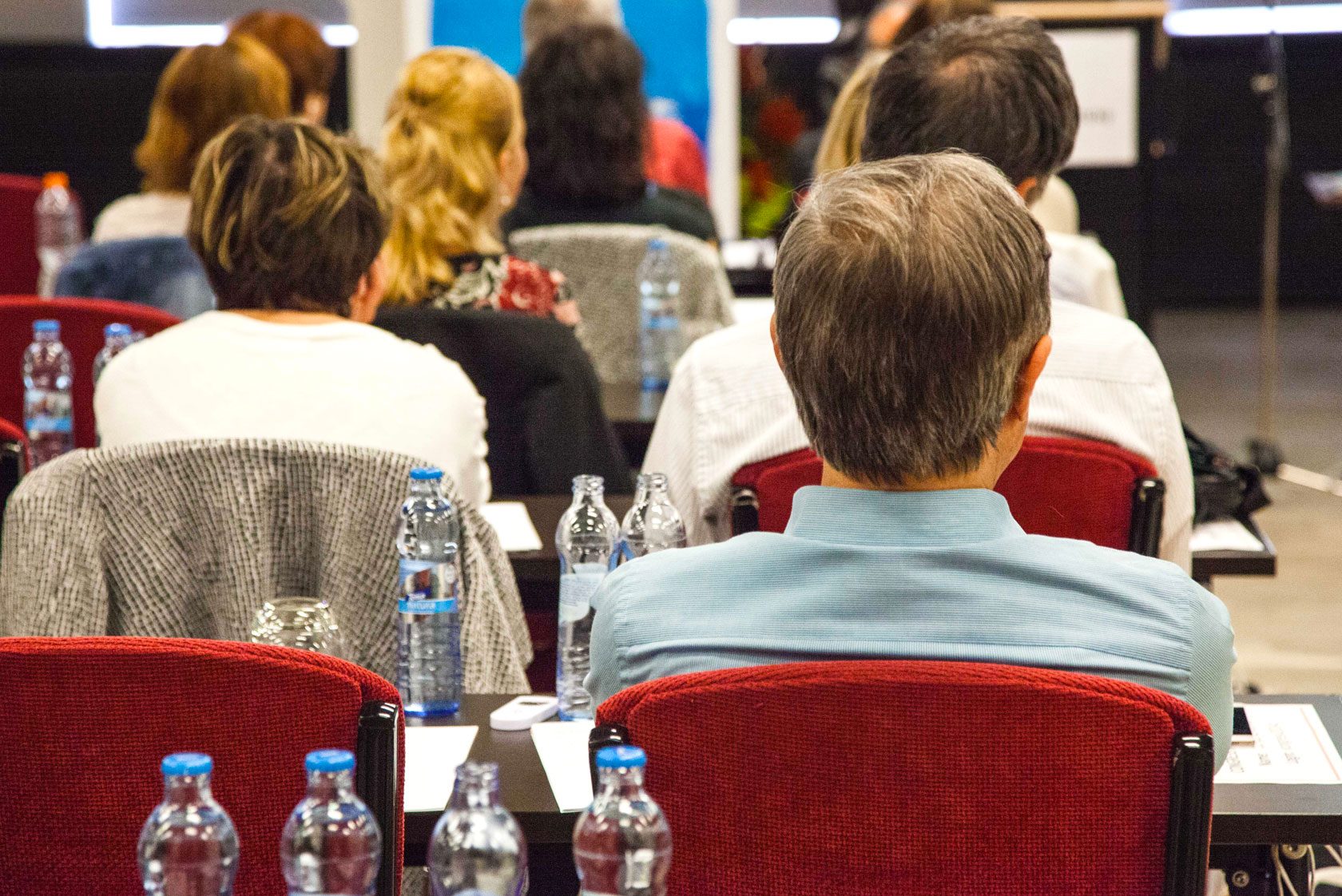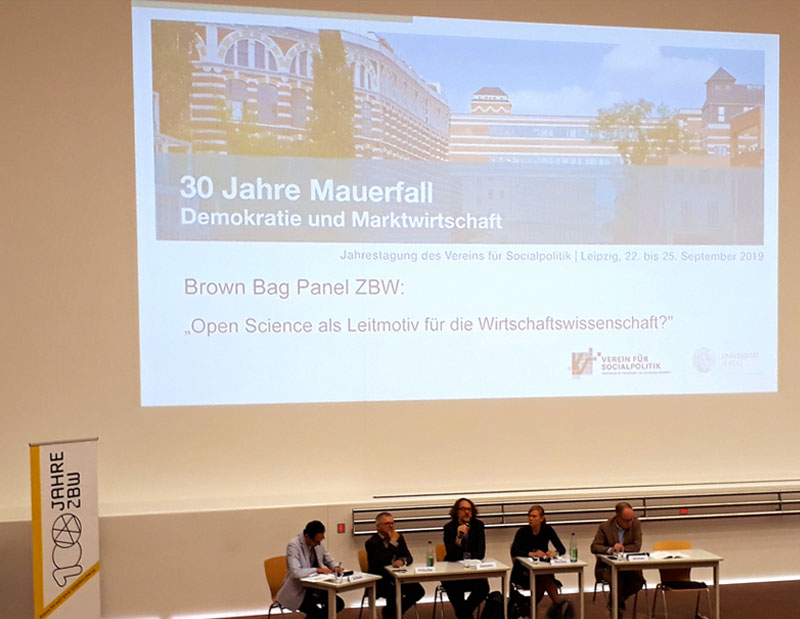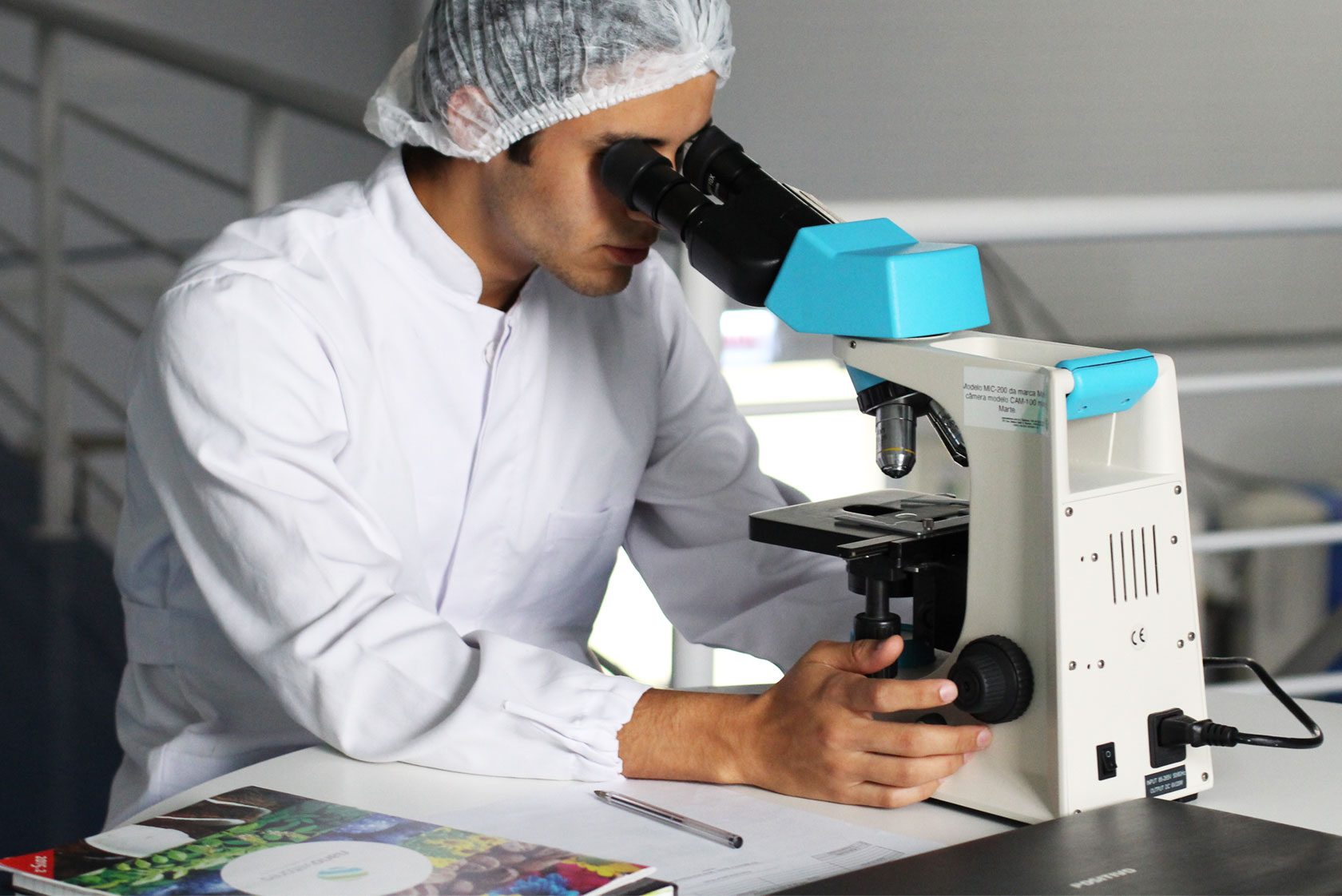
Open Science Infiltrates the Engine Room of Research: ZBW Panel at the German Economic Association Annual Conference 2019
The annual conference of the specialist economics association “Verein für Socialpolitik” took place this year from 22. - 25. September 2019 at the University of Leipzig. Under the conference theme “30 Years after the Fall of the Berlin Wall” close to 800 researchers came together to discuss the economic effects of German unity as well as a whole host of other specialist themes.
by Olaf Siegert
The ZBW was also represented in the conference programme at this year’s annual conference of the German Economic Association (22 – 25 September 2019 at the University of Leipzig), specifically with a panel on the topic of “Open Science as a leitmotif for economics?”.
The panel discussion was chaired by Willi Scholz as chair of the theme Open Science, in its various facets, accompanied by four representatives of the research community:
- Ulrich Fritsche ( University of Hamburg), among other roles co-editor of the open access, open peer review journal Economics
- Joachim Gassen (Humboldt University of Berlin), among other roles deputy spokesperson of a collaborative research centre with open science elements (link in German language)
- Sarah Necker (Walter Eucken Institut – Center of Excellence in Political and Constitutional Economics, Freiburg), among other roles coordinator of a larger “study on the topic of good economic practice and scientific misbehavior”
- Joachim Winter ( LMU Munich), among other roles coordinator of the data centre of the collaborative research centre “Rationality and Competition” and of the LMU-ifo Economics & Business Data Center (EBDC)

After a brief round of introductions, the first question to be asked was what potential open research approaches offer for scientific communication within economics research. The panellists all agreed that open science offers the opportunity to overcome the credibility crisis, in particular the so-called reproducibility crisis, within economics research. Joachim Gassen drew attention to the results of a Gallup poll published over the summer, which provides clear evidence of a loss of credibility on an international scale.
Joachim Winter added that to start with, for the author, open science generally involves a greater amount of time spent on meeting the respective standards, time that is also, however, invested by the current generation of PhD students. This, he believes, is largely due to the fact that important funding bodies as well as the leading specialist association, the American Economic Association, with its journals, have directed their guidelines at open science. Nevertheless, many researchers assume that with open science there is a risk of intellectual property theft if, for example, other researchers use datasets or manuscripts the original authors have published and in doing so are publishing in journals sooner than themselves.
Following this, the panel shed light on the lines of conflict that exist between the open science approach and other scientific policy guidelines or established processes of scientific communication, for instance, what are the obstacles to the establishment of open science. On this note, Sarah Neckar stressed in particular the high pressure to publish felt by economics researchers throughout their careers, as a result of which the necessity to get published as quickly as possible in high-ranking journals can act as an incentive to deviate from the rules of good economic practice and, for example, publish your own research results such as prepared data and text manuscripts as late as possible to avoid any alleged intellectual property theft. By contrast, Sarah Necker welcomed the practice stemming from psychology of pre-registering datasets and in doing so also claiming ownership for oneself. This practice is now being increasingly adopted within economics research. However, even in this case there is potential for misuse, e.g. „Parking“ (“pre-registering after the results are known”). This is where researchers repeat their experiment (or their data analyses) until results are produced which fit their hypothesis. Only after this will the data be registered.
Following on from this, Willi Scholz asked the panellists which indicators should be established for open science that are also particularly suitable for economics. Ulrich Fritsche explained that for a start, any system of indicators for open science would need to be well thought through so as not to provide false incentives. To exemplify such false incentives, Ulrich Fritsche alluded to the unquestioned counting of tweets about research results on Twitter. It struck him that in general it is not particularly high-quality papers that are being shared, but rather those on popular topics (which under certain circumstances, however, are of rather less scientific importance). This is why quality control or the establishment of qualitative indicators is warranted.
Discussion then moved onto the subject of which dimension of science (research, teaching, transfer) can expect to see the greatest progress through open science. The panellists also contributed their own estimations. Joachim Gassen sees the greatest advantage of open science within the research community itself, where in future even the groundwork underpinning important research results such as the preparation of a dataset could be rewarded; on this note he spoke firmly of the “engine room of research”. Such a reward might take the shape of it becoming customary for larger research groups than previously joining forces to publish a research result in a major journal jointly as a group of authors. Joachim Winter underscored this point and furthermore saw the greatest potential for open science in teaching, paying reference to open educational resources, a field with great potential for further expansion. In turn, Ulrich Fritsche expected to see the greatest progress in the area of knowledge transfer, referring to the various social media channels on which the latest research findings can now be very rapidly shared and which also offer the opportunity for civil society and political decision-makers to directly interact.
What role should scientific policy play in the further implementation of open science? On this question the panellists were largely in agreement that the move towards more open communication practices should and must come from within the community itself. Specialist journals but also important funding bodies like the German Research Foundation would have a central role to play in this. On the flipside, from a policy point of view Joachim Gassen would like to see less pressure to produce figures and for contracts to be awarded subject to less criteria. For him, open science is above all a collaboration and this is not something that can be perfectly captured in terms of numbers, something scientific policy should steer well clear of. Policy should also buck the current trend of data being heavily commercialised even though they stem directly from citizens or public institutions. Scientific policy should seek to intervene here (take the example of the US Federal Commission).
To close, Willi Scholz summed up the most important findings of the panel as follows: In science we have already witnessed a cultural shift in the direction of open science that the business model of the last five to ten years will no longer allow for in future. Junior researchers have recognised this and are already investing in open science practices. As a result, open science has already infiltrated the engine room of research and will no longer only be credited with knowledge transfer to civilians. The further implementation of open science will demand more of science itself than of scientific policy. Pre-registration, replicability studies by larger research groups and quality indicators are regarded as the means by which this can be achieved.
Olaf Siegert is head of the Publication Services department and Open Access Representative of the ZBW – Leibniz Information Centre for Economics. He is involved with open access as part of his work at the ZBW and is also active for the Leibniz Association, where he represents the Leibniz Open Access working group in external committees. He is involved in the Alliance of Science Organisations in the working group Scientific Publication System and at Science Europe for the Leibniz Association.
View Comments

Guidelines: Electronic Lab Notebooks in Research Data Management
An electronic lab notebook ideally represents one component within an entire system...



